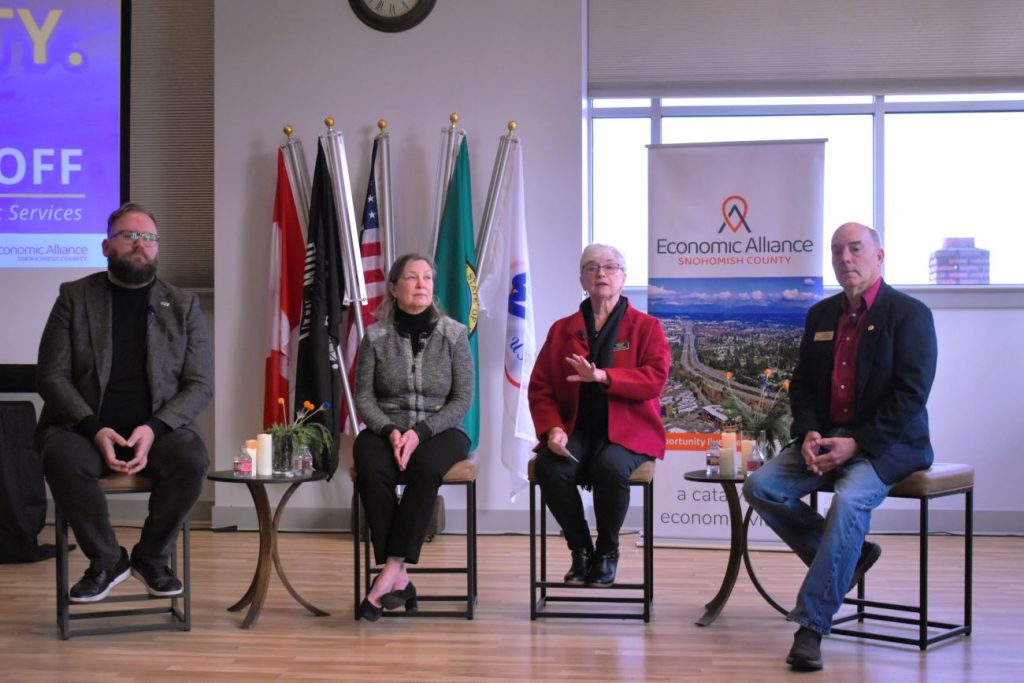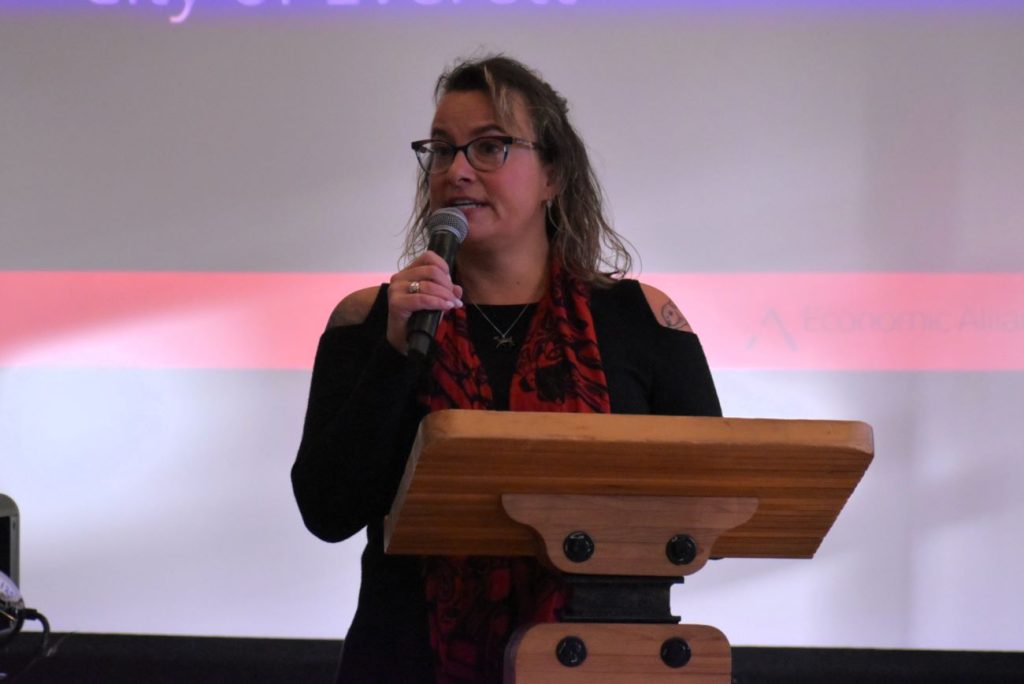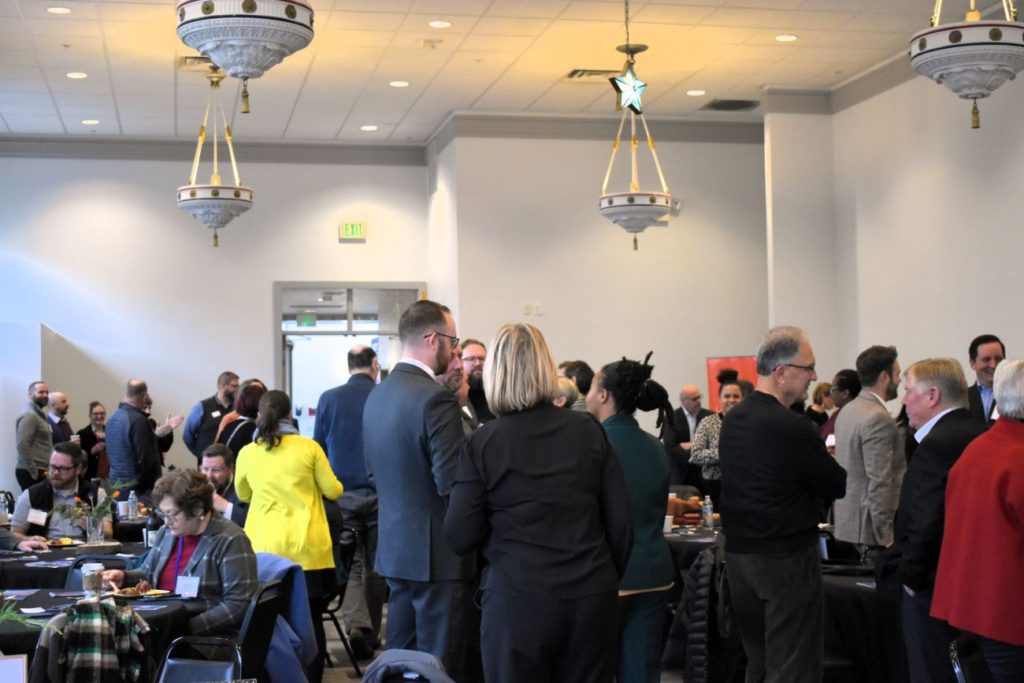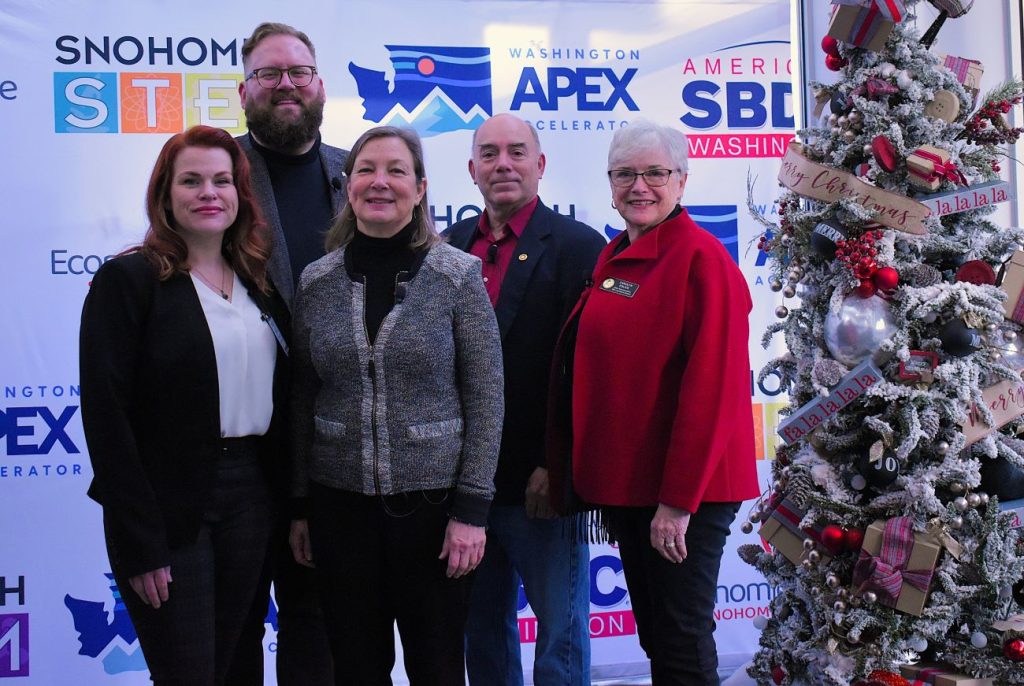EVERETT—Under the theme “One County, One Voice,” Representative Mary Fosse (D-Everett) moderated a bipartisan forum hosted by the Economic Alliance Snohomish County (EASC) on December 5 at Elks Lodge in Everett where panelists discussed housing affordability, behavioral health, childcare, economic development and labor force, transportation, infrastructure, and public safety.

With Washington state facing a projected budget deficit of at least $10 billion over the next four years due to increases in government spending coupled with lower-than-expected tax revenues, the 2025 Legislative Session will undoubtedly test even the most skillful and resourceful lawmakers in Olympia. Luckily, Snohomish County is home to state legislative chairs of several very powerful committees ready to take on this monumental challenge.
Thursday’s panelists were Senators Marko Liias (D-Edmonds), June Robinson (D-Everett), and Keith Wagoner (R-Sedro Woolley), along with Representative Carolyn Eslick (R-Sultan). Sen. Liias is the Chair of the Senate Transportation Committee and Sen. Robinson is the Chair of the Ways & Means and Vice Chair of the Health & Long Term Care committees. Sen. Wagoner is a former member of the Law and Justice, Ways & Means, and Agriculture, Water, Natural Resource, & Parks committees; and Rep. Eslick is the Ranking member on the House Human Services, Youth, & Early Learning Committee.

“I expect that all options will be needed, not just looked at but we will have to implement cuts,” Senator Robinson told a room of about 100 in attendance on how the legislature will address the states deficit. “We will have to delay programs that are currently in statute that are causing some of the increased costs into the future, and we will need to look at all types of revenue options just to maintain the services that the people I represent, and I believe the people of our state expect.”
Outgoing Governor Jay Inslee (D) on December 2 imposed a freeze on state hiring and nonessential contracts and travel in response to a projected $10 billion deficit. Robinson shared that legislators are awaiting Inslee’s proposed budget no later than December 17 before leaving office in January.
In a Seattle Times interview the same day as the forum, Governor-elect Bob Ferguson (D) shared that he is looking for budget cuts but is not ruling out tax increases proposed by lawmakers.
“We are looking at savings, efficiencies, how we can do better as a state. That’s the first, second and third conversation as far as I am concerned, before even entertaining anything else,” Ferguson said.
State Sen. Mark Mullet (D-Issaquah) and Rachel Smith, CEO of the Seattle Metropolitan Chamber of Commerce are leading Ferguson’s efforts to reduce state spending.
When asked if Democrats will consider expanding capital gains tax as an option to help reduce the budget deficit, Senator Robinson told the Lynnwood Times that it is early in the process to commit to any one solution and that “all options are on the table.”
“I am sure there will be talk about expanding that [capital gains taxes] in some way, whether that gets legs or not is [another story],” Senator Robinson said.

In the fall, Washington voters overwhelmingly rejected statewide initiatives aimed at repealing a tax on carbon (I-2117), eliminating a payroll tax for long-term care insurance (I-2124) and a capital gains tax on the sale or exchange of certain assets over $250,000 (I-2109). Senate Majority Leader Jamie Pedersen (D-Seattle) shared with the Washington Standard, that “voters sent a clear message this year” which may provide some additional insight on Olympia’s 2025 legislative priorities.
“They [voters] want quality public schools, affordable housing and health care, a clean environment, and safe communities,” Senator Pedersen said in a statement. “With an expanded majority, we’re ready to tackle these priorities in the 2025 legislative session.”
Republican Senator Wagoner shared that the last budget passed by the legislature “was the most responsible budget in a long time” and remains hopeful that both caucuses will find an amicable solution to the deficit.
He added that if the legislature would use a zero-based budgeting process, where the state budget is reset to zero every budget period for all expenditures to be justified before being funded, it could have avoided, what he told the Lynnwood Times, “overspending.”
“The problem is that there is an infinite number of deserving projects out there, but at some point, you have to say no, we can’t afford it; and that has been a hard thing,” Senator Wagoner told the Lynnwood Times. “When the money is coming in it is really easy to say yes and now it is an entitlement or perceived entitlement.”
When Governor Inslee took office in 2013, the state’s annual operating budget was approximately $38.4 billion according to the Washington Policy Center. After 12 years of the Inslee administration, the state is now spending $75.5 billion per year—a 96% increase whereas the population of Washington has only increased 17% during the same period.
“It’s overspending and eventually overspending is going to catch up with you,” Wagoner said.
Senator Liias emphasized the importance of strengthening the apprenticeship pipelines within Washington state adding that the challenge of accessing skilled workers significantly contributed to budget increases in the transportation sector.
“If we don’t have the workforce to build clean energy, transportation, and aerospace sectors of the future we are all going to pay for that in the long term,” Senator Liias said. “This is an all hands-on-deck moment.”
Liias highlighted the upcoming Machinist Institute being built in Everett, the Sound Transit pre-apprenticeship program at Edmonds College, and construction industry apprenticeship programs as successes in Snohomish County contributing to its future workforce. He added that Washington State Ferries is assessing how to embed early worker training in the K through 12 system and that hopefully shop classes can one day return to middle school.
Senator Robinson added the success of the Regional Apprentice Pathways Program at Marysville Pilchuck High School which is tailored for students in rural communities allowing them to become trained professionals in the building trades.
Representative Eslick shared that she will be supporting efforts of regulatory reform in childcare to reduce costs and improve accessibility. She added that there is a bill to incentivize businesses to allow a childcare provider onsite that would not only address accessibility issues but also cost constraints for working families.
In the 2023 Washington Association of Sheriffs and Police Chiefs annual crime report, Washington State still hasn’t returned to lower pre-pandemic crime rate levels and still ranks last in staffed police officers per capita in the nation. The per capita rate of law enforcement officers fell to 1.35 per thousand statewide in 2023, which is the lowest per capita rate ever recorded. The national average is about 2.31.
Senator Liias, who is also a member of Governor-elect Ferguson’s transition team underscored the incoming governor’s commitment to public safety by making it one of his “core priorities.”
“Safety is not just a statistic, it is also how we feel as we move around in our communities,” Liias said.
He shared that Ferguson will focus on improving the per capita rate of law enforcement officers. Liias would like to see more community policing work where law enforcement can continue to develop relationships and build positive relations with residents.
In October, the Washington State Justice Training Commission held a soft opening for its newest regional law enforcement training center set to officially open in Arlington in February 2025. Liias shared that this effort by Senator John Lovick (D-Mill Creek) and others not only increase training capacity throughout the state, but that more women are now expected to enter the profession in Snohomish County because a closer facility works within their family commitments.
“I will tell you, if there is anyone I want policing, it is single moms,” Liias joked with the crowd. “They know how to get stuff done and keep stuff in order.”
Both Senators Liias and Wagoner added that it may be time for the legislature to consider adjustments to public safety laws that may not be working as intended when these were enacted following the death of George Floyd.
“Nobody wants a juvenile badgered or interrogated in a way that violates their rights, but it is hampering law enforcement’s ability to get facts quickly,” Senator Wagoner said.
He would like to see exceptions to the law when a juvenile is involved in a crime involving a gun, violent crime, auto theft, and/or reckless driving.

The 2025 Washington State Legislative Session begins on January 13, 2025. Governor-elect Bob Ferguson is scheduled to be sworn in on January 15. Below are the legislative committees local Snohomish County representatives will be leading during the 2025 session:
- Rep. Lillian Ortiz-Self (D-Mukilteo) as majority caucus chair
- Sen. Marko Liias (D-Edmonds), Chair of the Senate Transportation Committee
- Sen. John Lovick (D-Mill Creek), Vice Chair of the Senate Transportation Committee
- Senator June Robinson (D-Everett), Chair of the Ways and Means Committee; and Vice Chair of the Health & Long Term Care Committee
- Sen. Jesse Salomon (D-Shoreline) Chair of the Local Government, Land Use & Tribal Affairs Committee; and Vice Chair of the Agriculture, Water, Natural Resources & Parks Committee
- Rep April Berg (D-Mill Creek), Chair of the Finance Committee
- Rep. Julio Cortes (D-Everett) Vice Chair of the Business, Financial Services, & Trade Committee; and Vice Chair of the Human Services, Youth, & Early Learning Committee
- Rep. Brandy Donaghy (D-Snohomish), Vice Chair of the House Innovation, Community & Economic Development, & Veterans Committee; and Vice Chair of the Transportation Committee
- Rep. Mary Fosse (D-Everett), Vice Chair of the Labor & Workplace Standards Committee
- Rep. Shelly Kloba (D-Bothell), Chair of the Regulated Substances & Gaming Committee
- Rep. Strom Peterson (D-Edmonds), Chair of the Housing Committee
- Rep. Cindy Ryu (D-Shoreline), Chair of the House Innovation, Community & Economic Development, & Veterans Committee
Author: Mario Lotmore













One Response
Hey fellow WA voters, elections have consequences! Enjoy!